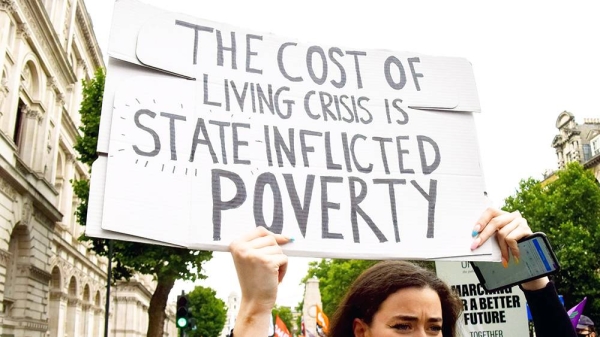
Women are increasingly being forced to engage in “survival sex” because of the cost of living crisis amid worsening conditions for Britain’s most vulnerable.
Charities warn that rising costs paired with years of underfunding mean women, including those with trauma and mental health issues, are having to turn to sex in exchange for housing or to meet other basic needs.
Sex for rent – when landlords demand sex in return for discounted or free accommodation – is a growing problem as economic conditions tighten, they said, with perpetrators using it as a tool to abuse and control.
It is particularly an issue among migrant women and asylum seekers, the Observer understands. The crisis is also making it harder for those trying to leave abusive relationships.
The Beyond the Streets charity said the cost of living crisis is driving those who are already vulnerable to turn to survival sex to meet the cost of bills and rent, leading to increased exploitation and abuse.
A support worker for the charity said she had spoken to women who are trapped in escorting or selling sex and several who are having to “top up” low-wage jobs with sex in order to make ends meet.
A spokesperson for the charity said: “The cost of living crisis is a driver [of survival sex], and for those already vulnerable, they face considerable exploitation. There is a lack of government funding to support the needs of women, and charities are struggling as their incomes reduce, expenses increase and they are faced with more demands on their services.”
Latin American Women’s Aid (LAWA) has seen multiple cases of “sex for rent” in recent months involving female asylum seekers. In one of the cases, a woman had been sofa-surfing for several months when she met a man who promised to provide her with accommodation before going on to sexually abuse her while she was sleeping.
Belén Ruiz, the charity’s violence against women and girls advice centre coordinator, said: “It is unacceptable that women in such vulnerable circumstances are exposed so frequently to harassment and intimidation, being doubly victimised and unable to seek redress.”
Some cases, she added, involved the harassment and abuse of asylum seekers while in public law accommodation facilities. “This makes them afraid of accessing these services, which makes them easy prey for abusers living in private accommodation.”
Tilly Smith, of the Generation Rent campaign group, said sex for rent is “clearly going on”. “As we’re looking at a particularly bleak economic situation, danger grows and grows.”
Women’s Aid said those contacting the organisation were in “dire and desperate need” and that rising living costs were making it even harder for people to leave abusive relationships.
Lucy Hadley, the charity’s head of policy, said: “In the difficult economic context that we’re in at the moment, we know that women are experiencing increased and exacerbated levels of controlling and financial abuse from perpetrators.”
Last week the home secretary, Suella Braverman, announced that she was considering a new law targeting landlords who exploit vulnerable people for sex, and launched a call for evidence. It came after the announcement last month of a trial of one-off payments to help domestic abuse victims leave abusive relationships.
While Hadley said the fund was a “good first step”, the £300,000 fund fell short of the £1m they had requested, and the action on sex for rent was not tackling the root causes of the problem, which she said were homelessness, poverty and inequality.
A Home Office spokesperson said: “Exploitation through ‘sex for rent’ is already illegal under the Sexual Offences Act. The government recently launched a public call for evidence which brings us closer to ending this deeply harmful trend and better protecting victims.
“We are committed to stopping all forms of violence and intimidation against women and girls, including domestic abuse. While we directly fund charities to help victims leave abusive relationships, we also will invest over £230m more widely through our Tackling Domestic Abuse plan.”












